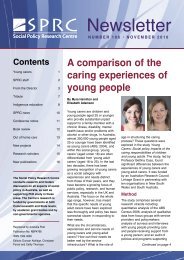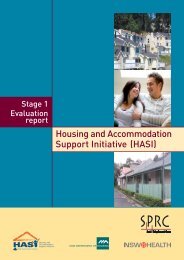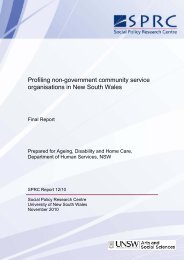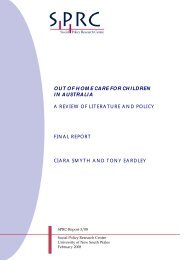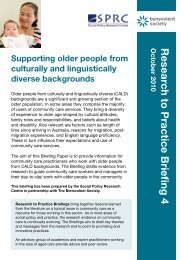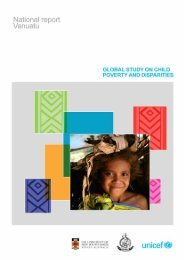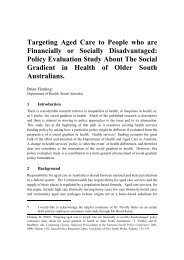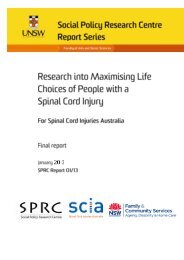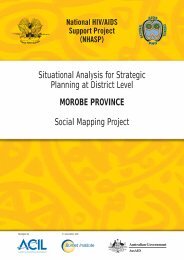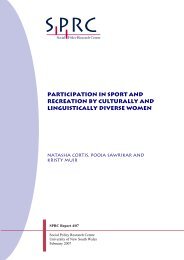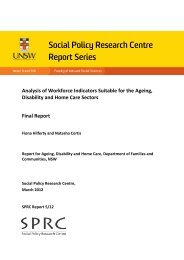A Strategic Assessment of the Children's Services Industry
A Strategic Assessment of the Children's Services Industry
A Strategic Assessment of the Children's Services Industry
- No tags were found...
Create successful ePaper yourself
Turn your PDF publications into a flip-book with our unique Google optimized e-Paper software.
STRATEGIC ASSESSMENT OF THE CHILDREN’S SERVICES INDUSTRYTASMANIALaunching into LearningLaunching into Learning (LIL) was announced as an election commitment in Tasmania inMarch 2006. It is a $12.6m initiative led by schools to support families with young childrenfrom birth to four years. LIL was implemented to better target children and families at risk in<strong>the</strong> Tasmanian community and to help to give children <strong>the</strong> best possible start in life and atschool. The programme recognises parents as <strong>the</strong> child’s most influential teacher and aims tobuild on parental capacity in order to enable <strong>the</strong>m to enhance and support <strong>the</strong>ir child’s lifelonglearning. Specifically LIL aims to positively impact on children’s early learning andschool readiness as well as supporting families in need.Educational Needs Index (ENI), Principal leadership and school readiness determined whichschools were involved in <strong>the</strong> programme. Twelve schools were established as hub schoolsacross <strong>the</strong> state and, in its first full year, 42 schools participated. Currently 102 schools arefunded to participate in <strong>the</strong> programme.A management team consisting <strong>of</strong> Learning Service Managers and Principals oversee <strong>the</strong>programme. Each Learning Service has Launching into Learning Coordinators who workfrom hub schools to support schools and programmes. Schools are required to keep records <strong>of</strong>attendance and achievement data.The programme grew from good practice in schools and <strong>the</strong> increasing understanding <strong>of</strong> <strong>the</strong>research into early brain development and learning. Data from state wide KindergartenDevelopment Checks and Performance Indicators in Primary School statistics also highlighted<strong>the</strong> need for early intervention and <strong>the</strong> importance <strong>of</strong> engaging parents and children inlearning and socialisation.Those schools already demonstrating <strong>the</strong>ir commitment by <strong>of</strong>fering quality birth – fourprogrammes were <strong>the</strong> first identified for <strong>the</strong> programme.Highlights: Parental and child participation in <strong>the</strong> programme far exceeded targets and earlyexpectations. It was intended that through Launching into Learning partnerships with o<strong>the</strong>rservices and agencies would develop and this has occurred to varying degrees around <strong>the</strong>state. Partnerships with <strong>the</strong> Tasmanian Early Years Foundation, ‘Good Beginnings’, ‘Let’sRead’, Communities for Children’, Colony 47, community organisations, local councils,Child Health <strong>Services</strong> and child care facilities have all added to <strong>the</strong> quality and diversity <strong>of</strong><strong>the</strong> programmes on <strong>of</strong>fer.Challenges/hurdles: Whilst participating schools have embraced <strong>the</strong> programme, <strong>the</strong>challenge <strong>of</strong> how to engage our most vulnerable and ‘at risk’ families continues. Greaterinteragency collaboration and information sharing is seen as a key to overcoming this hurdle;however we are progressing slowly in this regard.Contacts:Cheryl Larcombe (Dept <strong>of</strong> Education) cheryl.larcombe@education.tas.gov.auJan Batchelor (Dept <strong>of</strong> Education) jan.batchelor@education.tas.gov.au65



